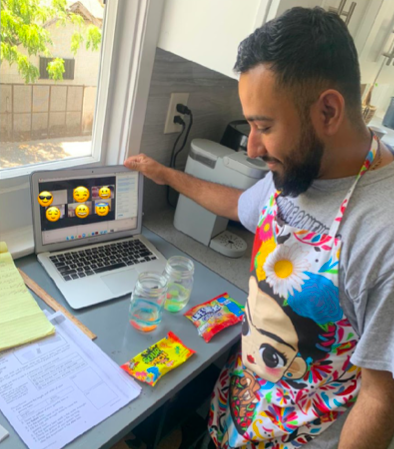Raise your hand if most of what you know about science came from Bill Nye, the Science Guy? If we were in a physical room right now, I’m certain half of the millennials’ hands would go up. This speaks as much to the greatness of Bill Nye’s PBS show to how badly science was taught in school.
These days, I am the teacher and even though I know the importance of science for my student’s future, I still find ways to give the subject minimal attention. Why is that? Part of it, admittedly, would be my own lack of background knowledge on the subject. The other part, however, would be how much priority our district seems to place on English Language Arts and Math and the standardized test scores that come along with those subjects.
So this summer, I decided to do something about it. Every Wednesday I am hosting “Summer Science” via Zoom to last year’s class. I am not getting paid for this time, but we as teachers are used to donating our time constantly. This is obviously optional for students and ungraded. And I think that is why it is so powerful.
By making this a low-stakes (no-stakes, actually!) class, students feel no pressure to perform and are able to just be curious, inquisitive, and bold. All the experiments come from a booklet I bought off the dollar section at Target which means nearly zero planning time needed. I made a packet of a handful of these experiments, and handed them out to students on the last day of school. I post reminders of what materials will be needed the day before on our class website. Students can choose to follow along at home or simply watch me perform the experiments on their screen. They probably join the Zooms more to see their friends than to learn science, but even then, I believe this format of class provides great value.
As I go through the experiments from the comfort of my kitchen, I throw in content vocabulary like, “variables”, “control group”, and “hypothesis”. Using a Jamboard from Google apps, I invite students to post questions or responses along with light prompts along the way.
Through this process something has become clear to me: Students are learning and they are having fun. What else could we possibly want out of our lessons? Therefore, my takeaway and call to action is: Can we lower the stakes on science so that students feel free to ask questions, take risks, and simply enjoy the process? Can we give more time during the school day for simple exploration, without the cloud of grading and judgement looming over student’s heads? And, can we pay teacher bonuses to run optional enrichment classes that allow teachers to be creative while showing students that true learning is intrinsic?
Bill Nye always said, “Science rules!”…. maybe it is time for our science education to rule too.

